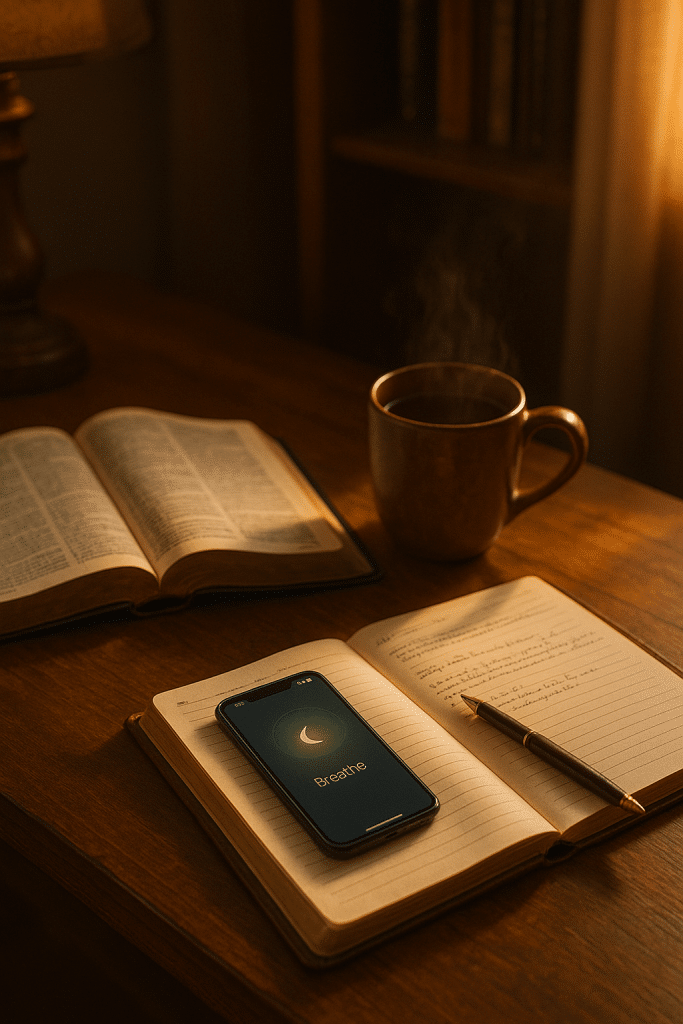Anxiety Coping Strategies That Actually Work – Faith‑First Guide
Estimated reading time: 8 minutes
Feeling trapped inside your own mind can feel exhausting. Yet many believers still assume they must simply “pray harder” when panic strikes. The truth is more hopeful. Modern research and Scripture together reveal anxiety coping strategies that actually work – a set of effective anxiety relief tools you can trust.
By understanding how the body’s stress circuits, daily habits, and spiritual practices interact, you can move from relentless worry to sustainable calm. In the pages ahead you will learn why anxiety persists, what science and the Bible agree on, and which daily rhythms bring genuine relief. Every technique is grounded in evidence and wrapped in grace, so you can practice with confidence instead of guilt.
Whether you battle occasional unease or daily dread, these proven tools will help you breathe, refocus, and live the joyful life God intends. The road will involve small, consistent choices, but each step rewires both brain and heart toward peace. Keep this article bookmarked; revisit the exercises during tense moments, and share them with friends who struggle. Freedom is possible, and it starts with one informed, faith‑filled decision.
Understanding Anxiety: Mind, Body & Faith
Your pulse races, your chest tightens, and worst‑case scenarios flood your thoughts. That sequence is the body’s perfectly normal alarm system—the sympathetic nervous response—firing at the wrong time. Researchers at Harvard call this chronic over‑activation the “false alarm” of modern life. When deadlines, headlines, and pinging devices never end, cortisol stays elevated and nerves remain on edge.
From a biblical perspective, this reaction is not a moral failure. Even Elijah collapsed under terror after confronting the prophets of Baal, and Jesus sweated blood in Gethsemane. Scripture validates the reality of physiological stress and shows that God meets people in it. Understanding the biology removes shame and positions you to apply anxiety coping strategies that actually work.
Practically, adrenaline dissipates within minutes if no new fear thoughts reignite it. Therefore, one goal is to interrupt the worry cycle quickly. Simple, physical signals—like lengthening your exhale or placing a hand on your heart—tell the brain “danger has passed.” Pairing that signal with a short prayer (“Lord, You are near”) magnifies the calming effect by engaging both body and spirit. In short, anxiety is a whole‑person issue that demands a whole‑person solution. When you realise the symptoms are protective but mis‑timed, you can thank your body for trying to help, then steer it back toward safety with the tools you will discover below.
Renewing Your Mind: Thought Replacement
Thoughts act like megaphones to the nervous system. If your inner dialogue screams “I can’t handle this,” muscles tense and breathing shortens. Cognitive‑behavioral therapists call these fear‑amplifying beliefs distortions; Paul labelled them “arguments and lofty opinions” that exalt themselves against the knowledge of God. The good news is that distorted thinking can be retrained.
Start by noticing recurring phrases. Do you predict catastrophe, personalise every setback, or use all‑or‑nothing language? Write the thought, challenge its accuracy, and replace it with truth. For example, “I’ll freeze during tomorrow’s meeting” becomes “I might feel nervous, yet God equips me and I can prepare well.” Over time this mental exercise literally prunes anxious neural pathways and strengthens rational ones.
Incorporating Scripture accelerates the shift. Meditating on Philippians 4:6‑8 or Psalm 46 redirects attention toward stability. Neuroscientists at Amen Clinics found that spiritual meditation quiets the amygdala more effectively than secular mindfulness for many subjects. Because biblical meditation adds hope, it sticks. The practice may feel awkward initially, but daily repetition for thirty days engrains it. These mindset shifts are central to anxiety coping strategies that actually work, because they stop anxiety at its source—the appraisal of threat—so you reduce symptom spikes before they start. Therapists describe these proven anxiety tips as mental push‑ups that strengthen resilience.

Daily Habits for Effective Anxiety Relief
Habits either inflame or soothe the stress response. Too much caffeine, inconsistent sleep, and doom‑scrolling late at night prime the body for alarm before the day begins. Conversely, rhythmic routines send repeated safety signals. Consider adopting the following daily pattern.
Morning Rhythm
Hydrate, move for at least ten minutes, and pray before opening social media. Exercise releases endorphins that counter cortisol, and prayer anchors your mind in God’s sovereignty.
Mid‑Day Reset
Schedule a five‑minute breathing break. Use a 4‑7‑8 pattern—in‑hale four counts, hold seven, ex‑hale eight—while silently repeating “Be still and know.”
Evening Wind‑Down
Dim lights ninety minutes before bed, jot lingering worries into a journal, and play soft worship music. Research in the Journal of Sleep Medicine confirms that such routines deepen rest.
Nutrition matters as well. Trade the second sugary latte for a lunch rich in protein, complex carbs, and magnesium‑packed greens. Many readers report that swapping soda for sparkling water reduces jitters within days. Alongside the schedule changes, simple anxiety management techniques like body scans and progressive muscle relaxation train awareness of tension before it spikes.
Establishing predictable rhythms may feel mundane, yet it is one of the anxiety coping strategies that actually work because it trains your nervous system to expect peace more often than panic. Over several weeks, consistent cues build a resilient baseline that prevents many flare‑ups altogether. These daily disciplines function as anxiety coping strategies that actually work because they regularly reset the body before fear spirals. Even when stressful events arrive, your strengthened baseline allows you to recover faster and remain present with family, work, and worship.
Community & Counseling: Anxiety Management Techniques
You were never meant to battle fear in isolation. Studies reviewing more than thirty trials show that people who pray with others, attend worship, and engage trusted mentors experience significantly lower anxiety scores. Community provides perspective and accountability for practicing the anxiety coping strategies that actually work.
Start by identifying one safe person you can text the moment panic whispers. Simply naming the feeling out loud often drops intensity by half. If symptoms persist or impair daily function, seeking a Christian counselor is wise stewardship, not weakness. Cognitive‑behavioral therapy combined with faith elements matches medication in effectiveness for many disorders, and sometimes medication provides an essential bridge until skills take hold.
Support groups also help. Many churches host anxiety workshops or Celebrate Recovery nights where members share victories and setbacks without judgment. Hearing testimonies like Sarah’s—who cut caffeine, used faith‑based CBT, and dropped her GAD‑7 score from severe to mild in three months—fuels hope. Additionally, serve others. Volunteering shifts attention outward, releases dopamine, and reinforces identity beyond “the anxious one.” Counselors often provide anxiety management techniques that blend Scripture with science.
Remember, God often heals through people. Galatians 6:2 calls believers to “bear one another’s burdens,” and James 5:16 links confession and prayer to healing. Therefore, schedule connection like any other therapy appointment; your future calm depends on it. Consistent relational engagement rewires social neural circuits, proving again that relationship remains God’s chosen conduit for lasting transformation.
Tools and Products: Anxiety Coping Strategies That Actually Work
Books
Switch On Your Brain by Dr. Caroline Leaf combines neuroscience, Scripture, and 21‑day brain‑building exercises. Readers report sharper focus and reduced rumination within weeks.
The Anxious Christian by Rhett Smith reframes anxiety as a doorway to deeper trust and purposeful action.
Apps
Abide offers guided Christian meditations, bedtime stories, and breath prayers. Usage data show regular listeners fall asleep 25 percent faster than before.
Insight Timer – Christian Track features free worship‑based mindfulness sessions.
Nutritional Support
Natural Calm Magnesium Magnesium promotes muscle relaxation and steady mood. Consult your physician before use.
Internal Deep‑Dive Articles
These resources complement the anxiety coping strategies that actually work described above. Think of each recommendation as another set of effective anxiety relief tools placed in your spiritual toolbox. Use them to build a personalised, sustainable plan that respects both body and spirit. Budget wisely, and if finances are tight, start with free practices such as breath prayer and walking, which research confirms provide powerful benefit at zero cost. Remember, tools serve you; they are not masters. Try one addition at a time, evaluate after two weeks, and keep what genuinely lowers tension without creating dependency.

Hope‑Filled Conclusion For Effective Anxiety Relief
Anxiety seldom disappears overnight, yet hope grows each time you practice. By combining biological calming cues, renewed thinking, healthy habits, supportive community, and Christ‑centered resources, you wield anxiety coping strategies that actually work. Because each domain reinforces the others, even small progress multiplies.
Expect setbacks. When they arrive, view them as signals to return to basics: breathe slowly, pray honestly, journal distorted thoughts, and reach out for help. Over months, those routines become reflexes that crowd out panic. Count victories too: the commute you completed calmly, the meeting you entered with steady breath, the night you slept without racing thoughts. Gratitude rewires the brain toward optimism.
Most importantly, remember God’s promise: “Fear not, for I am with you.” His presence travels with you into boardrooms, supermarkets, and sleepless nights. You do not battle in your own strength. Therefore, step forward today, confident that freedom is possible and peace is promised. Your future self will thank you for beginning now. Share this article with a friend, join hands in prayer, and celebrate each step. Together, we can build communities where calm is normal, faith is vibrant, and anxious hearts find rest. Keep rehearsing these anxiety coping strategies that actually work until peace feels natural. Download the full research PDF below for in‑depth explanations, printable worksheets, and scripture cards to keep truth at your fingertips during stressful moments.







